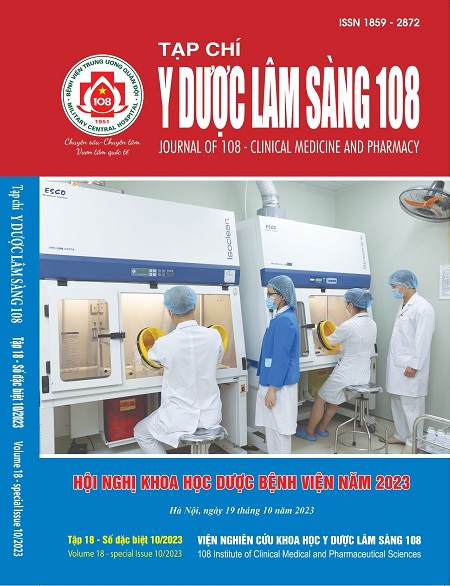Evaluation of medication use in patients with renal insufficiency at 108 Central Military Hospital
Main Article Content
Keywords
Abstract
Objective: Develop a list based on consensus among medical literature and analyze prescribing practices of contraindicated medication in patients with severe renal insufficiency at 108 Military Central Hospital. Subject and method: A list of drugs that should be avoided for certain glomerular filtration rate (GFR) values was established based on consensus among various regulatory agencies. A retrospective observational study from July to December 2022 was conducted using electronic medical records of patients with severe renal insufficiency admitted to the hospital. Demographic and clinical data were collected, including patient age, sex, weight, comorbidities, medication history, and laboratory results. Prescribing practices of medication that should not be used were assessed using the developed formulary. Result: Out of over 2500 drugs of the hospital, 14 drugs were identified with estimated GFR equations. Among 143261 prescriptions in the study period, 485 (0.36%) contraindications were detected. In addition, in 95396 patients who were prescribed one or more of the medications in the list, there were approximately 0.16% (n = 151) of those had at least one contraindicated medication. Franilaxâ (Spironolactone & Furosemide) was the most prevalent prescriptions, accounting for 64.3% of patients. Conclusion: The study provides evidence for the desperate need of establishing a protocol to manage drug use in patients with severe renal impairment. The application of CDSS to prescribing software can be a promising solution to this situation.
Article Details
References
2. Lipska KJ et al (2016) Citizen petition to the US food and drug administration to change prescribing guidelines: The metformin experience. Circulation, 134(18): 1405-1408.
3. Michaels AD et al (2010) Medication errors in acute cardiovascular and stroke patients: A scientific statement from the American Heart Association. Circulation 121(14): 1664-82.
4. Roux-Marson C et al (2020) Medication burden and inappropriate prescription risk among elderly with advanced chronic kidney disease. BMC Geriatrics 20(1): 87.
5. Ltd, GPE (2019) Summary of Product Characteristics Acarbose 100mg Tablets 2019; Available from: https://www.medicines.org.uk/emc/product/10000/smpc/print.
6. Laroche ML, Charmes JP, and Merle L (2007) Potentially inappropriate medications in the elderly: A French consensus panel list. Eur J Clin Pharmacol, 63(8): 725-731.
7. Helmer-Hirschberg O (1967) Analysis of the future: The delphi method. Santa Monica, CA: RAND Corporation.
8. American Geriatrics Society 2023 Updated AGS Beers Criteria® for potentially inappropriate medication use in older adults. J Am Geriatr Soc.
9. Administration, T.U.S.F.a.D. (2016) FDA revises warnings regarding use of the diabetes medicine metformin in certain patients with reduced kidney function.
10. Agency, t.E.M. (2016) Use of metformin to treat diabetes now expanded to patients with moderately reduced kidney function.
11. Vasisht KP et al (2010) Limitations of metformin use in patients with kidney disease: Are they warranted? Diabetes Obes Metab 12(12): 1079-1083.
12. Roussel R et al (2010) Metformin use and mortality among patients with diabetes and atherothrombosis. Arch Intern Med 170(21): 1892-1899.
13. Warren RE et al (2007) Introducing estimated glomerular filtration rate (eGFR) into clinical practice in the UK: implications for the use of metformin. Diabet Med 24(5): 494-497.
14. Ekström N et al (2012) Effectiveness and safety of metformin in 51 675 patients with type 2 diabetes and different levels of renal function: A cohort study from the Swedish National Diabetes Register. BMJ Open 2(4).
15. Eppenga WL et al (2014) Risk of lactic acidosis or elevated lactate concentrations in metformin users with renal impairment: A population-based cohort study. Diabetes Care 37(8): 2218-2224.
16. Compendium, e.m. Cozaar - Comp 100/12.5mg Film-Coated Tablets Summary of Product Characteristics. 2022; Available from: https://www.medicines.org.uk/emc/product/7783/smpc/print.
17. DailyMed T (2020) Losartan potassium and hydrochlorothiazide - losartan potassium and hydrochlorothiazide tablet, film coated. 2020; Available from: https://dailymed.nlm.nih. gov/dailymed/drugInfo.cfm?setid=e0b74a86-3d36-1af0-e538-41b45b8d2cc3.
18. Doody HK et al (2015) Retrospective evaluation of potentially inappropriate prescribing in hospitalized patients with renal impairment. Current Medical Research and Opinion 31(3): 525-535.
19. Guirguis-Blake J et al (2018) Prescription of high-risk medications among patients with chronic kidney disease: A cross-sectional study from the Washington, Wyoming, Alaska, Montana and Idaho region Practice and Research Network. Fam Pract 35(5): 589-594.
20. Youssef A et al (2015) Contraindicated medications administered to inpatients with renal insufficiency in a Saudi Arabian hospital that has a computerized clinical decision support system. Journal of Taibah University Medical Sciences 10(3): 320-326.
21. Jardine MJ et al (2010) Aspirin is beneficial in hypertensive patients with chronic kidney disease: a post-hoc subgroup analysis of a randomized controlled trial. Journal of the American College of Cardiology 56(12): 956-965.
 ISSN: 1859 - 2872
ISSN: 1859 - 2872
